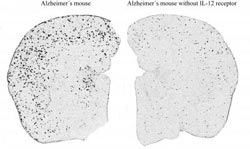Alzheimer's disease in mice alleviated promising therapeutic approach for humans

Deficiency (or inhibition) of molecules of the interleukin (IL)-12 and/or IL-23 signal pathway reduces Alzheimer-like pathological changes – depicted here as so-called â-amyloid plaques (spot-like areas, stained in black) – substantially. Left: Brain hemisphere of an Alzheimer’s mouse; right: Brain hemisphere of an Alzheimer’s mouse without IL-12 receptor.<br><br>Credit: UZH<br>
The accumulation of particular abnormal proteins, including amyloid-ß (Aβ) among others, in patients' brains plays a central role in this disease. Prof. Frank Heppner from the Department of Neuropathology at Charité and his colleague Prof. Burkhard Becher from the Institute for Experimental Immunology at the University of Zurich were able to show that turning off particular cytokines (immune system signal transmitters) reduced the Alzheimer's typical amyloid-ß deposits in mice with the disease.
As a result, the strongest effects were demonstrated after reducing amyloid-ß by approximately 65 percent, when the immune molecule p40 was affected, which is a component of the cytokines interleukin (IL)-12 and -23.
Relevant for human therapy
Follow-up experiments also relevant for humans showed that substantial improvements in behavioral testing resulted when mice were given the antibody blocking the immune molecule p40. This effect was also achieved when the mice were already showing symptoms of the disease. Based on the current study by Prof. Heppner's and Prof. Becher's team, the level of p40 molecules is higher in Alzheimer's patients' brain fluid, which is in agreement with a recently published study by American colleagues demonstrating increased p40 levels in blood plasma of subjects with Alzheimer's disease, thus showing obvious relevance for human therapy.
The significance of the immune system in Alzheimer's research is the focus of current efforts. Prof. Heppner and Prof. Becher suspect that cytokines IL-12 and IL-23 themselves are not causative in the pathology, and that the mechanism of the immune molecule p40 in Alzheimer's requires additional clarification. However, they are convinced that the results of their six-years of research work justify the step toward clinical studies in humans, for which they plan to collaborate with a suitable industrial partner.
IIn the context of other illnesses, such as psoriasis, a medication that suppresses p40 in humans has already been applied. “Based on the safety data in patients,” comment Profs. Heppner and Becher, “clinical studies could now be implemented without delay. Now, the goal is to bring the new therapeutic approach to Alzheimer patients quickly.”
Literature:
Johannes vom Berg, Stefan Prokop, Kelly R. Miller, Juliane Obst, Roland E. Kälin, Ileana Lopategui-Cabezas, Anja Wegner, Florian Mair, Carola G. Schipke, Oliver Peters, York Winter, Burkhard Becher, and Frank L. Heppner. Inhibition of IL-12/IL-23 signaling reduces Alzheimer's disease-like pathology and cognitive decline. Nature Medicine. November 25, 2012. doi: 10.1038/nm.2965
Media Contact
More Information:
http://www.uzh.chAll latest news from the category: Life Sciences and Chemistry
Articles and reports from the Life Sciences and chemistry area deal with applied and basic research into modern biology, chemistry and human medicine.
Valuable information can be found on a range of life sciences fields including bacteriology, biochemistry, bionics, bioinformatics, biophysics, biotechnology, genetics, geobotany, human biology, marine biology, microbiology, molecular biology, cellular biology, zoology, bioinorganic chemistry, microchemistry and environmental chemistry.
Newest articles

Silicon Carbide Innovation Alliance to drive industrial-scale semiconductor work
Known for its ability to withstand extreme environments and high voltages, silicon carbide (SiC) is a semiconducting material made up of silicon and carbon atoms arranged into crystals that is…

New SPECT/CT technique shows impressive biomarker identification
…offers increased access for prostate cancer patients. A novel SPECT/CT acquisition method can accurately detect radiopharmaceutical biodistribution in a convenient manner for prostate cancer patients, opening the door for more…

How 3D printers can give robots a soft touch
Soft skin coverings and touch sensors have emerged as a promising feature for robots that are both safer and more intuitive for human interaction, but they are expensive and difficult…





















